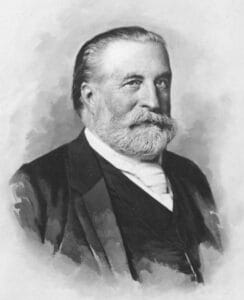
After Louis Pasteur showed that diseases were caused not by miasmas but by bacteria, Lord Lister pioneered antiseptic surgery by seeking to exterminate these unwelcome organisms with his carbolic acid pump. This martial approach was later followed by aseptic surgery, in which bacteria were to be kept out of the operating room and away from patients by the creation of a sterile environment. In this endeavor the German surgeon Ernst Gustav Benjamin von Bergmann made a substantial contribution by using heat instead of chemicals to sterilize surgical instruments.
Von Bergmann (1836–1907) has been described as “one of Germany’s most skillful surgeons” and Berlin University’s “most commanding personalities.”1 He was “tall, broad-shouldered, with the quick energetic movements that tell of a strong temperament, penetration and acute observation in his steel-blue eyes,” and “his was a notable figure alike in the lecture room and the operating theatre.”1 Born in Riga, Latvia, then capital of the Russian Baltic dominions, he was educated in Dorpat (now Tartu) in Estonia, and went to medical school there. After graduation, he obtained his doctorate on a pharmacological subject and then studied fat embolism in experimental animals.
From 1871 to 1878 he was professor of surgery in Dorpat, then in Würzburg (1878–1882), and finally at the Berlin University Hospital, where he remained for twenty-five years until he retired. He practiced general surgery and also devoted a large part of his career to the treatment of neurological diseases. He improved the management of gunshot wounds, having served as surgeon in the Prussian army in the Austro-Prussian War (1866) and the Franco-Prussian War (1870–71), and later in the Russo-Turkish War (1877–78).
Von Bergmann reduced the risks of surgery by performing many operations under local instead of general anesthesia. He pioneered an operation to excise hydroceles, improved appendectomy procedures, and performed the first successful operation on an esophageal diverticulum. As senior editor of a massive System of Practical Surgery, he wrote on pediatric neurosurgery, diagnostic radiography, and the localization and treatment of abscesses and tumors.2
Von Bergmann was a popular teacher, and it was said that there was never an empty space when he lectured. He taught at the Medical and Surgical Academy for the Military after being appointed there in 1882 by Emperor Wilhelm I. He was one of the doctors (with Morell Mackenzie) to attend to Frederick III in 1888 when the emperor was dying of laryngeal cancer.
Though described as masterful and sometimes rough in manner, “his heart held a wealth of kindness and devotion to his fellows.” He treated indigent patients in his house, gave assistance to Jews fleeing Russian pogroms, and was chief founder of the centralized ambulance organization in Berlin. He is remembered for his surgical and scientific prowess, but also for his reliability, engaging personality, and commitment to medical training.
References
- Obituary. His Excellency Professor Ernst von Bergmann, Berlin. BMJ April 6, 1907;1(2414):844-5.
- Zimmermann M. Life and work of the surgeon Ernst von Bergmann (1836-1907), long-term editor of the “Zentralblatt für Chirurgie”. Zentralblatt für Chirurgie January 1, 2000;125(6):552-60.
